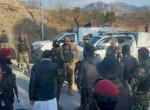With the 2014 deadline for withdrawal from Afghanistan fast approaching and the ISAF military effort unable to break the back of the Taliban insurgency, the US appears to have concluded (one daresay wrongly) that it has run out of options for effecting a responsible and honourable exit from the Afghan quagmire. The desperate quest for any sort of a face-saving political solution which will also allow its troops to pull out safely from Afghanistan is, at least for the foreseeable future, the only real policy objective that the Americans are likely to pursue in the Afpak region. But imperial hubris and the embarrassment of a hyper-power losing to a rag-tag militia armed with nothing more than fanaticism, small arms, IEDs and suicide bombers, is forcing the Americans to proclaim certain principles, or if you will red-lines, that will determine the course of its dialogue with the Taliban.
It is of course an entirely different matter that the manner in which the ‘political office’ of the ‘Islamic Emirate of Afghanistan’ in Doha was opened and which the US has touted as a major breakthrough, has blurred, if not entirely erased, some of the red-lines that the US had declared so solemnly time and time again. The new formulation is that the red-lines – breaking the alliance with Al Qaeda, respecting the Afghan constitution and taking part in elections and ensuring rights of women and minorities – will now be the outcome of, and not a pre-condition for, a dialogue. Worse, the US has effectively accorded the Taliban legitimacy and the status of a government-in-exile, thereby undermining the legitimate government of Afghanistan.
Showing remarkable spine and spunk, President Hamid Karzai has raised the red flag over the US-Pakistan-Taliban-Qatari-Saudi-British (the last being the real villains as is their wont; as a sample, read William Dalrymple’s latest self-serving ‘pulp strategic fiction’ essay written for Brookings Institution painting the conflict in Afghanistan as being more an India-Pakistan proxy war rather than a part of the Global War on Terror) shenanigans against the Afghan people. By suspending talks with the US, not only has President Karzai refused to be a pushover, he has also let it be known that he has the ability to put a spoke in the wheel of any peace process that either keeps the Afghan government out of the loop or leaves it in the lurch.
No one in any case was really getting fooled by all the resolute American talk of inviolable red-lines, certainly not the Taliban or their patrons, Pakistan. Convinced that the US is all set to throw in the towel, the Taliban (with a nudge and push from their sponsors in Rawalpindi) have agreed to enter into a dialogue to pave the way for the US to cut and run from Afghanistan. The way the Pakistan-Taliban duo see it, even if the US spin is accepted that the Taliban have become amenable to a dialogue because they are exhausted by war and are uncertain of complete victory over their enemies after the withdrawal of the foreign troops, it makes eminent sense for the Taliban to enter into a dialogue that holds the promise of giving to them on a platter that which they will not be able get through force of arms. Leave aside the fact that the hate filled fanaticism that functions as the real force driving the Taliban/Al Qaeda fighters is far from exhausted and has only strengthened with the ever-weakening resolve of the effete European armies and flagging spirits of the US military, it suits Taliban to gain a modicum of international acceptability by entering into negotiations with the Americans, precisely the argument forwarded by the Pakistanis to their clients to bring them to the talks table.
Unlike the Americans and other Western countries who seem to have bought into the nonsense about ‘reconcilable’ Taliban, the anti-Taliban forces suffer from no such false illusion. They know that the Taliban wouldn’t be Taliban if they were ‘reconcilable’. The world-view of the Taliban makes them incapable of living in peace with anyone who doesn’t accept or subscribe to their medieval and barbaric mindset. The Afghans know that any assurances or agreements that the Taliban enter into on the political future of their country will be observed only in their violation. After all, how can a self-declared Amir-ul-Momineen (leader of the faithful) agree to fight an election, especially one in which he may lose. The concept of Democracy is an anti-thesis of the concept of Amir-ul-Momineen, what with the former revelling in allowing dissent, which is anathema for the latter because his word is law. What is more, the Taliban have given absolutely no indication of any sort of a change in their attitude towards women, minorities (especially Shias) and on other social and political issues that made then Pariahs in the eyes of the international community when they were in power in the 1990s.
Equally worrying, and galling, for the anti-Taliban forces is the virtual outsourcing of Afghanistan to Pakistan by the Americans. The Pakistanis have been working overtime on not just the Americans but also on wooing various players inside Afghanistan, including elements of the erstwhile Northern Alliance, to move back into the driving seat in Afghanistan. To an extent, the Pakistanis have been successful in their endeavours, what with the Americans now conceding them the pivotal position in deciding the future of Afghanistan. Apart from playing mediators between the Americans and the Taliban and terror groups like the Haqqani Network, the Pakistanis have also reportedly managed to reach out to important anti-Taliban leaders, thereby playing all sides of the Great Game in Afghanistan. One way of looking at the Pakistani game-plan is that they are making a genuine push for a national reconciliation inside Afghanistan and playing the honest broker. But past record, and even more importantly the inherent perversity that seems to guide Pakistani strategic policy in the region, suggests that the Pakistanis are building leverages inside Afghanistan so that if things go awry after the exit of US troops and the Taliban do not follow the Pakistani diktat, they will have the option of using non-Taliban groups to keep the Taliban off-balance and embroiled in conflicts inside Afghanistan. If this means that Afghanistan continue to burn, then so be it.
As far as the Americans are concerned, they have absolutely no clear answer to give to the question on what their fallback position is going to be if the talks with the Taliban don’t really take off, or if the Taliban renege on the assurances and promises they make at the negotiation table. To put it simply, there is no Plan ‘B’. After all, once they exit, it is hardly likely that they will return to enforce the peace deal that they strike with the Taliban. There is some talk of a residual force staying back to support the Afghan government. But quite frankly, a small force of 8000-10000 men is going to be untenable and unsustainable for more than a year or two, certainly not beyond 2015-16. Quite asides the fact that such a small force would be more engaged in protecting itself (surrounded as it will be by hostiles) than in supporting the Afghan government, it will only serve as a red rag to the Taliban and their allies and affiliates. If anything then, this residual force is part of the American exit strategy because if the Americans were to announce today that all their forces will be pulled out on 31st December 2014, not a single Afghan would stand with the Americans tomorrow. It is precisely to avoid such a fate that the Americans are holding out the promise of not just a small force but also aid flows until 2025 to sustain the Afghan government. Of course, once it withdraws completely, whether these aid flows will continue and at what level and for how long remains an open question.
Try as they may, there is no way that the Americans can shake off the perception (based on facts on ground) that they have been defeated. While as an extra-regional superpower, the US might well be able to live with this setback, the impact of such a development on the region will be extremely destabilising. The reinforcing of the myth of Afghanistan being the Graveyard of Empires – the British in the 19th Century, the Soviets in the 20th and the Americans in the 21st – will in its wake unleash a new wave of instability, what with the Islamists of all hues emboldened by their triumph in Afghanistan running amok trying to export and impose their agenda on other countries in the region and beyond. It is of course another matter that Afghanistan’s reputation as an unconquerable country is utter nonsense and the result of faux historiography.
The reality is that before the British, Alexander, Timur, the Mughals, Nadir Shah and Maharaja Ranjit Singh all subdued the turbulent Afghans and held sway over all or a part of the Afghan dominion for fairly long periods of time. The British did not lose a single war they fought in Afghanistan. Sure, they suffered setbacks, which is part and parcel of any expedition. But what is important is that the dominance established by the British and the settlement they imposed on Afghanistan survived for nearly 150 years and only started unravelling in the aftermath of the ‘jihad’ against Soviet occupation.
In the case of the Russians, it wasn’t so much the Afghans who won but the Soviets who lost. Had the Americans not supported the Afghans with massive amounts of money and modern weaponry and training, the Russians might still have been sitting in Afghanistan. The game-changer was the shoulder-fired Stinger missiles. The Russians had bottled up the Afghan resistance and it was the Stinger Missiles turned the tide against the Russians as it prevented the Russians from using their attack helicopters and aircraft effectively. The other reason the Russians lost was the collapse of the Communist experiment. The short point is that without American assistance, the Afghan ‘mujahideen’ were nothing more than a nuisance for the Russians.
The only reason why the US is staring defeat in the face in Afghanistan is because of the critical mistakes it made. The first was of course the shifting of focus to Iraq in 2002-03. But the bigger mistake was the soft-peddling on the Pakistani double game on Taliban. The fact of the matter is that the Pakistanis never gave up supporting and sponsoring the Taliban – remember Musharraf’s advocacy of engaging the ‘moderate Taliban’ and the airlift of the ISI/Taliban leaders from Kunduz. It isn’t as though the Americans were not wise to Pakistan's game, only they did nothing except issue routine calls to ‘do more’ to force compliance on the Pakistanis. Without active Pakistani support, the Taliban would have been history. But having turned a blind eye to the Pakistani treachery, the Americans find themselves on the losing side of the war.
Even now, the US has options that could prevent Afghanistan from sliding into the arms of the Taliban/Al Qaeda/ISI conglomerate. But these options come into play only if the US is willing to recognise the reality that by outsourcing Afghanistan to Pakistan and ignoring the fact that the ideology of radical Islam joins the Taliban and Al Qaeda at the hip, is only going to create a mess that will ultimately come back to haunt it. This is not to argue that the Americans should stay on in Afghanistan; they should leave (earlier than scheduled, if possible). But instead of throwing Afghans to the wolves, the Americans should put their money where their mouth is. Rather than undermining the lawful and legitimate government of Afghanistan, the Americans should continue, and even increase, their monetary, material and military (without putting boots on the ground) support for the Afghan government and leaders and leave it to them to meet the Taliban and Pakistani threat as they deem fit.
More than anything else, this would be a truly Afghan-led, Afghan-owned and Afghan-driven process. Not only would this call the Pakistani bluff, and leave it with no choice but to clean their act or else see the collapse of the Pakistani state, it would also take the wind out of the Taliban sails. At a fraction of the $ 100-120 billion that the US is currently spending annually in Afghanistan, it can ensure the defeat of the Taliban. Despite all the scepticism being expressed about the fledgling Afghan National Army and Police and notwithstanding the problems that afflict this force (not the least of which is the high rate of desertions and reports of infiltration by the Taliban), the ANA has performed quite creditably on a number of occasions. With continuing support and assistance, there is no reason why the ANA and ANP will not be able to keep the Taliban at bay, more so because for the Afghan soldiery not allowing the Taliban hold sway in their country is a matter of their very existence. At the very minimum, the prospect of prolonged fighting might puncture the zeal of the Taliban and make them more amenable to reason, something that is extremely unlikely under the Doha process.
In India, there is a growing sense of disquiet over the US strategy on Afghanistan. Part of India’s problem is that its Afghan policy has been riding on the American shoulder since 9/11. Apart from the general policy paralysis that like in other cases has also affected the Afghan policy of the Indian government, there is the added problem of diffidence coupled with constantly looking askance towards the US for approval, if not permission, in forging a bolder security oriented strategy. While there are inherent limitations – geographical, financial and logistic – to how far India can go in supporting the anti-Taliban forces, there is a lot that India can still do at the political and diplomatic level to support the Afghan government. What India should however not do is to try and open a dialogue with the Taliban. This will be a disastrous policy because while on the one hand it will alienate India’s friends in Afghanistan, on the other hand, it will not help India win over its enemies who are not independent agents but proxies of Pakistan which has sponsored them precisely because they are implacably opposed to India.
If, as India claims, Afghanistan is critical to its national security, then the current policy of ‘masterly inactivity’ on Afghanistan is just not an option. India must do everything possible to ensure the defeat of the Taliban. If this means going counter to the US strategy, then so be it. Since the strategic convergence of interests between India and the US on Afghanistan has all but broken down, India must do everything necessary to protect its interests, just as the US is doing. The simple reason for this is not just the impact that a Taliban victory will have on the state of Jammu and Kashmir, but more importantly the fillip it will give to the rising attraction of radical Islam among a growing section of Indian Muslim youth. This more than anything else is something that the Indian state needs to become alive to. Living in denial of this trend will be an invitation to catastrophe.
Published Date: 3rd July 2013, Image Source: http://cache.boston.com










Post new comment